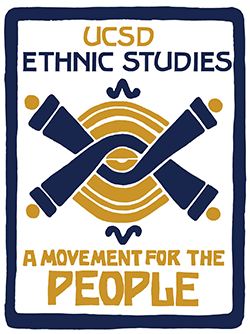Ethnic Studies Major Requirements
To receive a B.A. degree with a major in Ethnic Studies, students must meet the following requirements:
Lower-Division Requirements
Ethnic Studies offers several lower-division courses featuring an intensive introduction to issues of race and power that can be used toward earning a B.A, in Ethnic Studies. An undergraduate student earning a major in Ethnic Studies
-
ETHN 1. Introduction to Ethnic Studies: Land and Labor
-
ETHN 2. Introduction to Ethnic Studies: Circulations of Difference
-
ETHN 3. Introduction to Ethnic Studies: Making Culture
-
ETHN 1R. Remote—Introduction to Ethnic Studies: Land and Labor
-
ETHN 2R. Remote—Introduction to Ethnic Studies: Circulations of Difference
-
ETHN 3R. Remote—Introduction to Ethnic Studies: Making Culture
-
ETHN 20. Introduction to Asian American Studies
-
ETHN 30. Introduction to Chicanx & Latinx Studies
If you take ETHN 20 or ETHN 30 you need to submit a Student Petition to Ethnic Studies
Foundational Core Sequence
Complete all three courses in the ETHN 100A, ETHN 100B, ETHN 100C series. This three-part sequence on theories, methodologies, and praxis is required for an Ethnic Studies major. The core sequence consists of the following courses:
- ETHN 100A. Theoretical Approaches— an advanced survey of key issues, themes, and debates in the field of critical ethnic studies. ETHN 100A is only offered in the Fall Quarter of each academic year.
- ETHN 100B. Interdisciplinary Methodologies— an introduction to interdisciplinary research methodologies in critical ethnic studies. ETHN 100B is only offered in the Winter Quarter of each academic year.
- ETHN 100C. Social Justice Praxis— A capstone experience for Ethnic Studies majors, this course combines an advanced exploration of praxis-based approaches to social justice with independent campus, community, creative, or research practicum-based projects. ETHN 100C is only offered in the Spring Quarter of each academic year.
The foundation core sequence should be taken in order; however, the three courses need not be taken in the same academic year.
Upper-Division Electives
Majors must complete ten upper-division Ethnic Studies electives from those listed below. Please see current schedule for quarterly course offerings. Some courses outside of the major can be petitioned, but only three petitions via the Student Petition Process are appliable toward an Ethnic Studies B.A.

UCSD Plan: http://plans.ucsd.edu/
ETHN Course List
- ETHN 100M. Premedical Ethnic Studies Writing
- ETHN 101. Ethnic Images in Film
- ETHN 101TV. Ethnic Images on TV
- ETHN 102. Science and Technology in Society: Race/Gender/Class
- ETHN 103. Environmental Racism
- ETHN 103A. The United States and the Pacific World
- ETHN 104. Race, Space, and Segregation
- ETHN 105. Ethnic Diversity and the City
- ETHN 106. Life, Death, and the Human
- ETHN 107. Fieldwork in Racial and Ethnic Communities
- ETHN 108. Race, Culture, and Social Change
- ETHN 109. Race and Social Movements
- ETHN 109A. Race, Empire, and Japanese America
- ETHN 110. Cultural Worldviews of Indigenous America
- ETHN 111. Native American Literature
- ETHN 112A. History of Native Americans in the United States I
- ETHN 112B. History of Native Americans in the United States II
- ETHN 112C. California Native American History
- ETHN 113. Decolonizing Education
- ETHN 113A. Decolonizing Geology
- ETHN 114A. Representing Native America
- ETHN 114B. Representing Native America - Exhibition Design
- ETHN 115. Monsters, Orphans, and Robots
- ETHN 116. The United States-Mexico Border in Comparative Perspective
- ETHN 117. Organic Social Movements
- ETHN 118. Contemporary Immigration Issues
- ETHN 119. Race in the Americas
- ETHN 120. Race and Performance: The Politics of Popular Culture
- ETHN 120D. Race and Oral History in San Diego
- ETHN 121. Contemporary Asian American History
- ETHN 121R. Remote - Contemporary Asian American History
- ETHN 122. Asian American Culture and Identity
- ETHN 123. Asian American Politics
- ETHN 124. Asian American Literature
- ETHN 125. Asian American History
- ETHN 125R. Remote - Asian American History
- ETHN 126. Comparative Filipino- and Vietnamese-American Identities and Communities
- ETHN 127. Sexuality and Nation
- ETHN 128. Hip Hop: The Politics of Culture
- ETHN 129. Asian and Latina Immigrant Workers in the Global Economy
- ETHN 130. Social and Economic History of the Southwest I
- ETHN 131. Social and Economic History of the Southwest II
- ETHN 132. Chicanx Theatre
- ETHN 133. Latinx Theatre and Performance
- ETHN 134. Immigration and Ethnicity in Modern American Society
- ETHN 135A. Early Latino/a-Chicano/a Cultural Production: 1848 to 1960
- ETHN 135B. Contemporary Latino/a-Chicano/a Cultural Production: 1960 to Present
- ETHN 136. The Science and Critical Analysis of Environmental Justice
- ETHN 137. Latina Issues and Cultural Production
- ETHN 138. Black & Latinx Crossing
- ETHN 139. Chicano Literature in English
- ETHN 140. Comparative Refugee Communities from Vietnam, Laos, and Cambodia
- ETHN 140A. Refugee San Diego
- ETHN 141. Gandhi in the Modern World: From Civil Rights to the Arab Spring
- ETHN 142. Medicine, Race, and the Global Politics of Inequality
- ETHN 143. Chicana/o Film and Media Studies
- ETHN 144M. Antiracist Medicine & New Perspectives in Healthcare
- ETHN 146A. Theatrical Ensemble
- ETHN 147. Black Feminisms, Past and Present
- ETHN 149. African American History in the Twentieth Century
- ETHN 150. Visuality, Sexuality and Race
- ETHN 151. Ethnic Politics in America
- ETHN 152. Law and Civil Rights
- ETHN 153. Citizenship and Civil Rights in the Twentieth Century
- ETHN 154. History of Mexican America
- ETHN 155. US Militarism
- ETHN 155GS. Critical Perspectives on the Vietnam War
- ETHN 157. Madness and Urbanization
- ETHN 158. Native American Intellectuals in the 20th Century
- ETHN 159. Topics in African American History
- ETHN 160. Global Indigenous Studies
- ETHN 161. Black Politics and Protest Since 1941
- ETHN 162. Practicum in California Tribal Law and Journalism
- ETHN 163E. Decolonial Theory
- ETHN 163F. Playing Indian: Native American and First Nations Cinema
- ETHN 163FR. Remote Playing Indian: Native American and First Nations Cinema
- ETHN 163G. Indigenous Theatre and Performance
- ETHN 163I. Asian American Histography
- ETHN 163J. Asian American Social Movements
- ETHN 164. African Americans and the Mass Media
- ETHN 165. Sex and Gender in African American Communities
- ETHN 166. Arab/Muslim American Identity and Culture
- ETHN 167. Muslim Identity in America
- ETHN 167A. Decolonial Muslim Feminisms
- ETHN 168. Comparative Ethnic Literature
- ETHN 169. Origins of the Atlantic World, c. 1450–1650
- ETHN 170. Slavery and the Atlantic World
- ETHN 172. Afro-American Prose
- ETHN 173GS. Gender, Sexuality and War
- ETHN 174. Themes in Afro-American Literature
- ETHN 175. Literature of the Harlem Renaissance
- ETHN 177. Listening to the World
- ETHN 178. Blues: An Oral Tradition
- ETHN 178R. Remote Blues: An Oral Tradition
- ETHN 179. Discover Jazz
- ETHN 179A. Jazz Roots and Early Development (1900–1943)
- ETHN 179B. Jazz Since 1946: Freedom and Form
- ETHN 180. Topics in Mexican American History
- ETHN 182. Race, Gender, and Sexuality in Fantasy and Science Fiction
- ETHN 183. Gender, Race, Ethnicity, and Class
- ETHN 184. Black Intellectuals in the Twentieth Century
- ETHN 185. Discourse, Power, and Inequality
- ETHN 186. Queer of Color Performance
- ETHN 187. Latinx Sexualities
- ETHN 188. African Americans, Religion, and the City
- ETHN 189. Special Topics in Ethnic Studies
- ETHN 190.Research Methods: Studying Racial and Ethnic Communities
Special Studies*
- ETHN 197. Field Work in Racial and Ethnic Communities
- ETHN 198. Directed Group Studies
- ETHN 199. Supervised Independent Study and Research
- ETHN 100H. Honors Research Design **
- ETHN 196H. Honors Thesis **
*Only a total of two special studies courses will be counted in fulfillment of the elective requirement.
** Honors sequence: students must apply during Fall to participate in Winter and Spring
Pass/No Pass (P/NP) Grade Option for Spring 2020 Courses ONLY
Typically, except for independent study course electives (ETHN 197, 198, or 199) which are always taken with a Pass/Not Pass grade option, undergraduate students majoring in Ethnic Studies may take up to two courses, and students minoring in Ethnic Studies may take up to one course with a Pass/Not Pass option.
For Spring Quarter 2020 Ethnic Studies is waiving this limit and any courses taken P/NP during this period will not count toward the above limits for majors or minors. In addition, UC San Diego has deemed that any course taken P/NP in Spring 2020 will not count towards the 25% cap on P/NP courses for the Bachelor’s degree. Students must still select the P/NP option via WebReg and may change their selection of P/NP or Letter Grade through the end of Week 10 (6/5/2020).
To view the official deadline dates visit this UC San Diego webpage
Student Petition Form for non-ETHN Courses
Courses from other departments or colleges can be petitioned, please submit a Student Petition Form and the course syllabus via email to EthnicStudies@ucsd.edu for review. Review may take 4 to 6 weeks.
Satisfactory/Unsatisfactory (S/U) Grade Option for Spring 2020 Courses ONLY
For Spring Quarter 2020 graduate students in the Ethnic Studies Ph.D. program may select to take their courses with the S/U grading option instead of the standard Letter Grade.
Overlapping courses:
UC San Diego permits students to overlap (a.k.a. or share) up to two courses (8 units) between two majors or a major and minor of departments or programs with compatible topics. Ethnic Studies allows two courses to be overlapped or shared but some departments only permit one overlap. Overlaps are listed in the Double Major Petition form and the course(s) may need to be reviewed via the Student Petition Process for inclusion into the major or minor.
For more information:
For more information and degree planning, please contact: ethnicstudies@ucsd.edu. If you would like to declare an Ethnic Studies major or minor, please follow the steps on Tritonlink: under "Advising & Grades" click on "Major and Minor". Feel free to contact Ethnic Studies for help and support.
